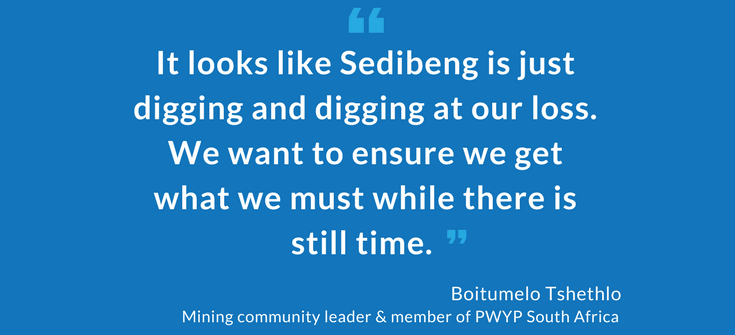Restricted Access to Information Leaves Communities in South Africa Powerless Against Mining Companies
Blogs and News

Born about 58 km from Kathu in the dusty town of Kuruman, Boitumelo Tshethlo has over the years grown a passion to fight for human rights in his community. ‘In 2011, I was working in Johannesburg and I closely followed the Marikana story until the fateful day that miners were murdered in broad daylight for asking for a decent wage. This made me furious and I vowed that I would spend my life fighting for rights of my people’ said a visibly angry Tshethlo. ‘I realized that my own communities in Northern Cape are facing similar challenges and I had to do something’.
Two years after the Marikana Massacre, Tshethlo formed an organisation called Northern Cape Mining Affected Communities in Action (NCMACA). With the organisation, Tshethlo has led the Maremane community to demand information from Sedibeng Iron Ore about its plans to support the development of the community. Sedibeng (PTY) Ltd; a subsidiary of world renowned Tata Steel Ltd located in Postmanburg close to Kathu, refuses to engage with the community, according to Tseheltho. Kathu is the iron ore capital of the Northern Cape Province, and it has one of the five largest open-cast iron ore mining operations in the world. NCMACA alleges that Sedibeng is doing nothing for the community and that they have been unable to access the Social and Labour Plan which outlines the plans that the company has for the community.
Does Sedibeng have something to hide?
When a company applies for a mining right, it is required to submit a number of documents on its plans to mine, which the Department of Mineral Resources then uses to assess whether the potential mine is viable. One of these documents is a social and labour plan (or ‘SLP’). An SLP is a legally binding document which communities can also use to monitor the activities of the company and hold authorities to account. The fact that the community can’t access the SLP, coupled with Sedibeng’s unwillingness to engage has led community members to question if the company is hiding information that would enable them to exercise their rights to hold Sedibeng to account.
It is clear that the government of South Africa acknowledges the importance of addressing this power asymmetry between companies and communities. In his State of the Nation Address (SONA) in February 2017, President Jacob Zuma identified the need for economic emancipation, calling for “a fundamental change in the structure, systems, institutions and patterns of ownership, management and control of the economy in favour of all South Africans, especially the poor, the majority of whom are African and female…”
As Publish What You Pay South Africa’s recent study on Sedibeng Iron Ore demonstrates, the inaccessibility of companies’ information is a key reason why the power asymmetry between companies and communities is maintained. Without access to payment agreement information which would shed a light on Sedibeng’s responsibilities to the communities within which it operates, communities like Maremane will remain powerless and Kathu may once again be faced with the tragic scenes of 2011.
According to Tshethlo who also resides in Kathu, nothing about Sedibeng Iron Ore is known by the communities and all efforts to find information have been fruitless or thwarted midway. Furthermore, it seems company employees are being discouraged from responding to community members’ request for information. By Tshethlo’s accounts, two Human Resources personnel who gave information were fired under unclear circumstances.
‘They fire any employee who seems to be interested in giving us attention. This has happened twice and we wonder what Sedibeng hides’
said Tshethlo. ‘It looks like Sedibeng is just digging and digging at our loss. We want to ensure we get what we must while there is still time. Besides the road that they built and use every day, we do not know of anything else that they have done for the community.” He added that community members simply want Sedibeng to be open to engagement and to disclose what they have done for the community since they started operations in 2012.
Let the people know
Access to information is a key prerequisite for significant community and or non-state actors’ participation in the Extractive Industry value chain. In Zimbabwe for example, where members of the mining community faced similarly fatal consequences for their demands, communities are now using data backed advocacy tactics to persuade diamond companies and their government to listen.
In South Africa, information on mining licensing applications, notifications, approvals, rejections, payments to the government and other important documents are not easily or readily available to the public. Companies also use the loophole that there is no definition of “commercially sensitive information’’ in the legislation. As a result, communities such as Maremane are denied access to information that would enable them to constructively exercise their rights. PWYPSA also notes that community activists who persistently exercise their rights risk persecution, in the past, some were maimed and others even lost their lives.
As PWYPSA’s study which supports the implementation of Mandatory Disclosure Laws puts forward, disclosure of payments, environmental permits and SLPs and associated documentation by mining companies operating in South Africa is imperative for improving compliance, informing dialogue and legislative or policy reform to establish and protect the rights of affected communities.









